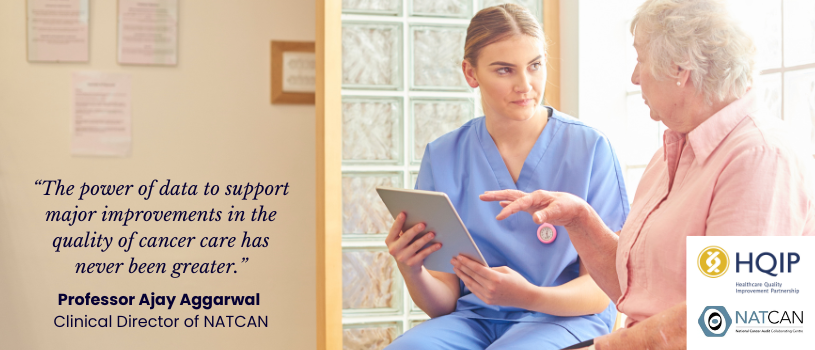
HQIP audits pave the way to better cancer care
Published: 24 Sep 2025
With World Cancer Research Day shining a light on cancer care today, we share an update on the HQIP-commissioned National Cancer Audit Collaborating Centre (NATCAN), which has recently published seven reports to support improving patient outcomes.
These reports use anonymous data from all patients cared for in England and Wales so that patients and the NHS can assess how well standards are being met, with data provided for individual hospitals, regions and nationally. Additionally, the audit projects use the data in their quality improvement work, providing support to hospitals to improve their care. The ovarian cancer project, for example, will work with individual regional teams to support them to improve the percentage of women diagnosed with ovarian cancer who receive treatment within 28 days after an emergency admission.
The latest NATCAN reports cover breast (primary and metastatic), kidney, non-Hodgkin Lymphoma, ovarian, pancreatic and oesophago-gastric cancer and set out recommendations for NHS cancer services. For the first time, they were published alongside results for individual NHS Trusts, Health Boards, and regions in the new NATCAN data dashboards. Services can review their own data and benchmark the care they provide against other services. Reports for bowel, prostate and lung cancer will follow in the months ahead.
Each audit considers the complexity of cancer care, recognising that a patient’s treatment plan must reflect the stage of their cancer, their fitness, and how likely they will respond to treatments. The latest reports show where and how variations in the quality of cancer care persist across the NHS.
“NATCAN audits should act as a beacon of improvement in cancer care. By learning from the findings, we can work together to ensure every cancer care professional delivers best clinical practice, and every patient gets the highest standard of care.” Professor Frank Smith, Vice President of the Royal College of Surgeons of England
With more than 900 new cancer cases per day, improving care and outcomes for patients has never been more crucial. Opportunities for improvements to cancer diagnosis and care can be found throughout the NHS 10 Year Plan, after Lord Darzi’s 2024 investigation of NHS England stated “the UK has appreciably higher cancer mortality rates than other countries”. This underlines the crucial importance of clinical audit in understanding where changes can lead to improvements in care and, in turn, patient outcomes.
NATCAN also places particular emphasis on patient engagement, with a patient and public involvement forum in place for each audit. Patients contribute to the development of the work right from the start, ensuring that people with lived experience of cancer play a central role in defining the quality improvement goals and activities of each audit, as well as co-creating outputs specifically designed to be patient-friendly.
“These reports provide a comprehensive overview of patterns of care and outcomes for patients, highlighting both progress and areas where further improvement is needed. We are proud to collaborate with professional groups, charities, and people with lived experience of cancer to ensure that our audits reflect real-world needs and drive meaningful change.” Dr Julie Nossiter, Director of Operations, NATCAN
Gold standard, collaborative commissioning
HQIP developed an innovative, umbrella approach to commissioning clinical audit so that one centre could host the ten NHS national cancer audits that are part of the National Clinical Audit and Patient Outcomes Programme (NCAPOP).
By bringing these audits under one organisation, rather than commissioning individual projects, benefits and efficiencies can be maximised early. This includes sharing good practice, centrally developing online dashboards and minimising operating costs. Ultimately – and crucially – this supports improved patient care and outcomes. NATCAN has become a centre of clinical, data science, methodological and epidemiological expertise, providing gold standard annual data. The Centre focuses on three “Rs”, ensuring that all activities are clinically relevant, methodologically robust, and technically rigorous.
Professor Ajay Aggarwal, Clinical Director of NATCAN explains: “The power of NHS data to support major improvements in the quality of cancer care has never been greater. We expect the findings from the NATCAN audits will be used by NHS Trusts to continue to drive standards of care and reduce inequalities.”
Find out more:
- The NATCAN programme, including links to each individual cancer audit from which you can access the State of the Nation reports
- NATCAN data dashboards
- Article: HQIP wins Best Procurement Delivery Award at the UK National Go Awards 2025 for proposing and enabling the creation of NATCAN
- Article: ‘An ′umbrella approach′ to audit: sharing, efficiencies and results’ (page 19) – Dr Julie Nossiter, Director of Operations at NATCAN, explains why the Centre is unique and what it is aiming to achieve
- The Royal College of Surgeons of England
- Interested in improving healthcare with HQIP? Our clinical audit training and support is here to help you

